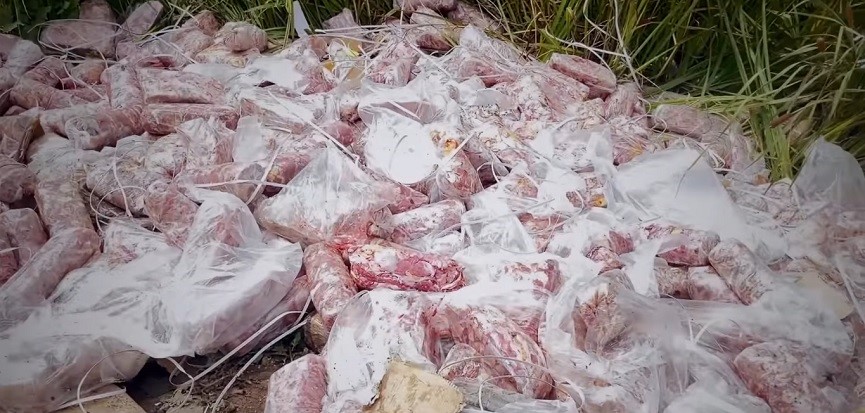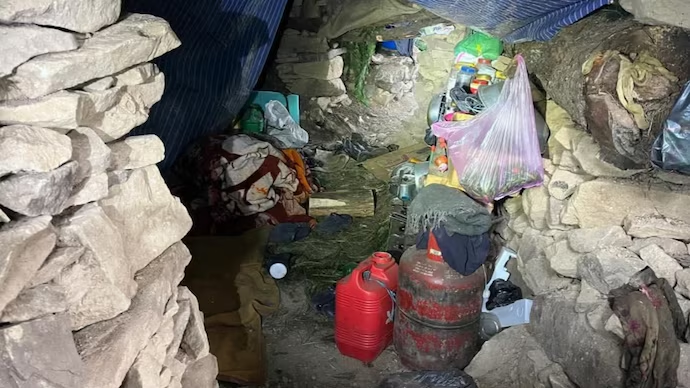Jammu Food Safety Crackdown: 27 Quintals of Expired Meat & Rotten Fish Seized
By: Javid Amin | Jammu | 09 July 2025
A Wake-Up Call for Jammu
In a decisive move to protect public health, Jammu authorities have carried out a large-scale seizure of 2,700 kg of expired chicken meat and 100 kg of rotten fish from a cold storage unit in the bustling Gummat area. The operation was jointly led by the Legal Metrology Department (LMD) and the Food Safety Department, marking one of the biggest food safety crackdowns in recent months.
The seized stock—emitting a strong putrid smell—was stored in unhygienic, unsafe, and unregulated conditions. With no labels, expiry dates, or proper refrigeration, the products posed a serious health hazard to consumers across Jammu and beyond.
What Authorities Found
During inspection, officials discovered:
-
2,700 kg of decomposed frozen chicken
-
100 kg of rotten fish
-
Stored in conditions violating basic hygiene and cold-chain requirements
-
Foul odour indicating advanced decomposition
Regulatory breaches included:
-
No packaging or expiry dates — making it impossible to verify product safety
-
Improper labelling and pricing — misleading consumers on product value and freshness
-
Unverified weighing machines — violating the Legal Metrology Act
-
Cold chain failure — meat stored at unsafe temperatures, accelerating spoilage
Legal Action & Enforcement
Authorities have registered:
-
Three cases under the Legal Metrology Act for labelling, pricing, and weighing violations
-
One case under the Food Safety and Standards Act (FSSA) for unsafe food storage practices
Specific provisions invoked:
-
Section 56 of the FSSA – Penalties for selling unsafe food
-
Section 32 of the FSSA – Issuance of improvement notices to prevent future violations
The confiscated stock was destroyed at the Kot Bhalwal dumping station in coordination with the Jammu Municipal Corporation (JMC), following standard operating procedures (SOPs) to prevent environmental contamination.
Part of a Larger J&K Crackdown
This operation is not isolated—it follows a string of alarming food safety violations across Jammu & Kashmir:
-
Kashmir Rotten Meat Scandal — Over 3,500 kg of adulterated and decomposed meat was destroyed earlier this year.
-
Synthetic Colour Ban in Wazwan — Authorities prohibited the use of banned dyes like Carmoisine and Tartrazine in meat dishes such as kebabs, biryani, and Gushtaba.
-
Counterfeit Sweets Seizure — Nearly 440 quintals of suspected adulterated Rasgullas were seized from an unlicensed cold storage in Bishnah.
These repeated incidents highlight deep-rooted lapses in food safety compliance and regulatory oversight.
Why This is a Public Health Emergency
Spoiled and unregulated meat can lead to:
-
Severe food poisoning (Salmonella, E. coli, Listeria)
-
Gastrointestinal infections causing dehydration and hospitalization
-
Long-term health risks from chemical contamination if preservatives or colours are used to mask spoilage
-
Religious violations in a region where halal compliance is critical
Medical experts warn that consumption of such meat—even in small quantities—can be fatal for vulnerable groups such as children, pregnant women, and the elderly.
Public Advisory: What Consumers Should Do
The Food and Drug Administration (FDA) and Legal Metrology Department have issued an urgent advisory:
-
Buy meat and fish only from licensed vendors displaying FSSA certification.
-
Check labels for manufacturing and expiry dates before purchasing packaged meat.
-
Inspect frozen products — avoid items with frost buildup, discoloration, or foul odour.
-
Report suspicious activity — call the toll-free helpline: 104.
-
Avoid brightly coloured meat products — they may contain banned synthetic dyes linked to cancer and allergic reactions.
Industry Impact & Community Response
-
Market trust erosion — Consumers are increasingly avoiding frozen and ready-to-eat meats.
-
Business disruption — Vendors face stock losses, penalties, and in some cases, closure of premises.
-
Religious leaders’ stance — Appeals have been made to ensure all meat products undergo halal verification and meet religious as well as safety standards.
Moving Forward: Building a Safer Food Chain
For lasting change, authorities recommend:
-
Regular surprise inspections of cold storages, meat processing units, and retail outlets
-
Mandatory training for meat vendors on hygiene and storage practices
-
Public awareness campaigns about the dangers of expired meat
-
Whistleblower rewards for reporting unsafe food practices
Bottom-Line
The seizure of 27 quintals of expired chicken and 100 kg of rotten fish in Jammu is more than just a food safety violation—it’s a stark reminder of the hidden risks lurking in our supply chain. As inspections intensify, consumer awareness will be the most powerful defence against unsafe food.
Remember: Safe food is not a luxury—it’s a right.




